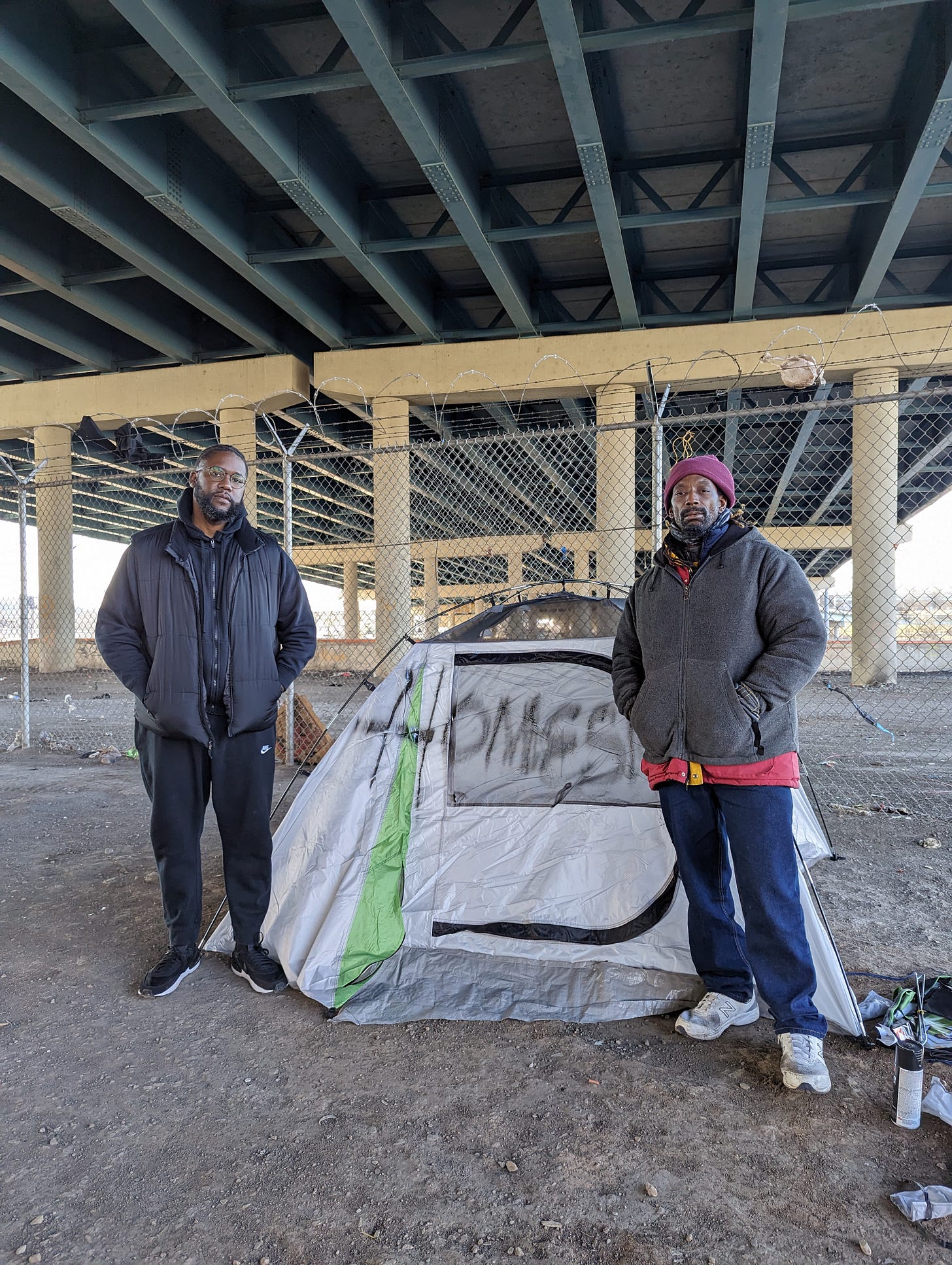Watch the Homesick Documentary:
My journey of shooting and defending a short film that explores how public policy, human worth, and homelessness intersect
After living on the streets in the state of Tennessee in January (for a week) to conduct research, on March 28th (a little over a month ago), I got to do something that not many people where I grew up in Atlanta have the opportunity to do: defend a dissertation and a documentary film.
Although, due to COVID, many defenses went from being in-person to online, I still admittedly was nervous and felt a deep sense of guilt.
I wrote these words out to read to the 40-plus people who showed up to hear me defend my dissertation entitled, “When Policy Overlooks Worth: Exploring Harmful Policies and Social Constructions that Exclude the Unhoused from Martin Luther King Jr.’s Beloved Community,”
“I acknowledge the fact that many young black individuals who face stacked odds never reach a point where scholarship is within reach. For that reason, I dedicate this moment to those individuals across the U.S. who, due to structural racism, concentrated poverty, and systemic issues, are kept from achieving academic greatness in the academy. I am not unaware that today is a demarcation of a privileged and exclusive journey.”
I chose the dissertation title and focus for three reasons:
Firstly, political and social rhetoric often portrays people experiencing homelessness as the undeserving poor and sometimes even criminals. These stereotypical portrayals have made people without address targets of harmful ordinances and public removal policies that ultimately make it harder for them to escape homelessness.
Secondly, while immersed in community work through an organization I co-founded called Love Beyond Walls, I began my academic journey with the philosophical assumption that how people view those experiencing homelessness in the U.S. is less influenced by proximity or historical understanding than by their social misframing of the unhoused.
These philosophical assumptions followed me through my academic journey and inspired questions like:
How do people arrive at exclusionary ideas about those who are unhoused?
What causes people to have a criminal response to their neighbors without an address?
In what ways did narrative play a part in this person’s social understanding of the unhoused?
Thirdly, research shows a growing number of cities, even Atlanta (the city where I live), are implementing hostile architecture, ordinances, and public policies that exclude and punish those unhoused in ways that directly attack this population.
As a result, those who are unhoused are criminalized and introduced into the criminal justice system. The criminal justice system affects those who are unhoused through three main factors: anti-homeless ordinances, quality-of-life ordinances, and disproportional impact (Herring & Yarbrough, 2015).1
In my scholarly opinion, social change happens by changing policy and humanizing the silenced voices of those affected by public policy in real-time.
Therefore, I chose to shoot a short film entitled HOMESICK: A Moral Call to Change the Narrative for the Unhoused to give those experiencing homelessness a chance to talk about their sense of worth in the face of criminalizing policies to accompany my written dissertation.
This documentary film reveals the gaps in policy and explores how counter-narratives can provide narrative justice for those unhoused. The film focuses on humanization and belonging while relaying stories experienced by those without an address in a way that centers their voices.
Through an ethno-film/cinema methodology, I discovered that allowing those experiencing homelessness to tell their own stories can challenge false criminal notions and give persons without an address the opportunity to voice their interests in the political process.
After defending, I gifted/donated the dissertation and documentary to the organization I co-founded (Love Beyond Walls) to add to the Dignity Museum.
When those experiencing homelessness can tell their own stories about these negative social constructions, it can challenge false criminal notions and allow them to voice their interests in the political process.
The film above is an extension of the research I have done over the years, and I am proud of it because it helped me answer one of my research questions:
Question 2
To what extent do individuals experiencing homelessness in the U.S. criticize public policy, and what are their specific critiques?
I wanted to shoot a film so that my scholarship could be public and used in a way that could mobilize action, build empathy, and highlight a community that is often attacked for not having anywhere to go.
In King’s vision of the Beloved Community, all people, regardless of race, class, or economic status, have access to all society offers. MLK saw the Beloved Community as a representation of the social nature of human existence. He often spoke of the interconnectedness of humanity, and the Beloved Community was a way to affirm that all people are a part of the human family, meaning that no one should be left out (including those who are unhoused).
Therefore, with this Substack, I introduce you to the film I shot called HOMESICK. It is more than just a critique of public policy from me as a researcher, but a passing of the microphone to those affected by public policy and social exclusion while homeless.
If you want to explore homelessness in the U.S., please consider checking out the book “I See You: How Love Opens Our Eyes to Invisible People.”
Or, subscribe to the Love Beyond Walls Newsletter—visit the site and sign up.
Herring, C., & Yarbrough, D. (2015). Punishing the poorest: How the criminalization of homelessness perpetuates poverty in San Francisco. SSRN Electronic Journal. https://doi.org/10.2139/ssrn.2620426






“Homeless is not a disease, it’s a desire to exist whether you got a house or not.” 😮💨🥹